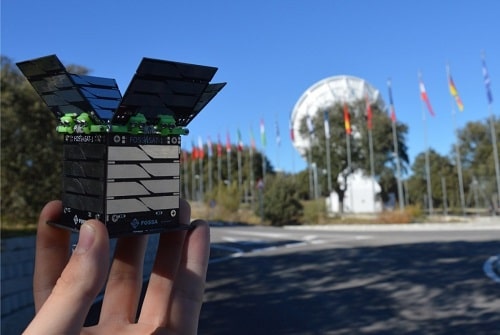The cost for developing space satellites is generally not less than million dollars. And the entire system’s enormous weight requires secure handling procedures, which can be only achieved in state-of-the-art research and development facilities. But with the launch of a LoRa-based mini satellite, the outlook towards building space satellites might soon change.

In a breakthrough advancement for picosatellite space technology, made possible by a team of young engineers and developers from around the world, FOSSA Systems (Free Open Source Software and Aerospace), a Spain-based aerospace startup, has successfully launched the FossaSat-1, a micro-satellite which has dimensions of just 5x5x5cm and weighs only 250 grams.
The launch took place from Rocket Labs, New Zealand at 08:18 UTC on December 6, 2019.
Despite the small size, FossaSat-1 aims to create the world’s first open source IoT network – for less than the cost of a car. This will benefit millions of students and individuals worldwide who will be now be able to individually communicate with the satellite using DIY receivers that cost under US$ 5. Thus, there will be no requirement of a dedicated single ground station for doing so.
Open source LoRa technology
Powered by an Atmega Arduino, this tiny satellite, also referred to as a PocketQube, carries a LoRa transceiver for providing inexpensive low power RF communications, which is compatible with the latest IoT technology, highly efficient TrisolX triple junction solar cells and an AVR-based OBC (On-board computer) that controls the entire communications system. Additional details regarding the hardware and the software are provided in the GitHub repository of FOSSA Systems. All this was build at a fraction of what a normal satellite would cost.
“FossaSat-1’s mission is to democratize access to space. FossaSat-1 will validate this PocketQube form factor which will create an ecosystem of satellite components and kits that are accessible to students, universities and businesses worldwide and give millions the opportunity to get involved in space research and launch their own satellite into space. We have partnered with several educational institutes that are carrying out picosatellite workshops using our open source hardware”, said Julian Hernandez, the 16 year old CEO and Co-founder of FOSSA Systems.
The PocketQube is currently orbiting earth and transmitting LoRa RTTY (Radio Teletype) signals from space to millions of ground based IoT sensors. The team is working on deploying antennas that will provide an increased signal strength for future launches.
FOSSA System’s vision is to make an impact on how aerospace systems are developed and taught, which will inspire a new generation of young scientists and future engineers.








